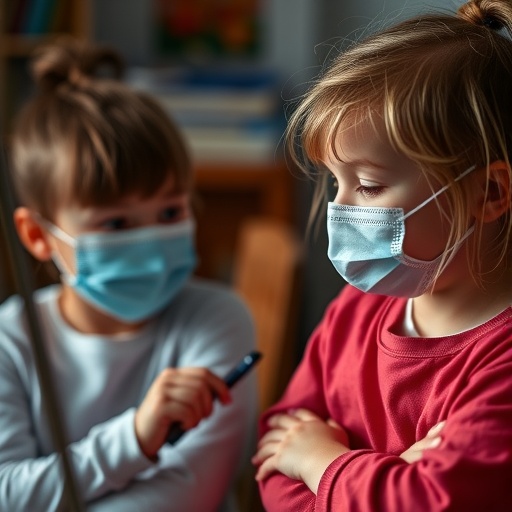A groundbreaking new study, published in the prestigious journal The Lancet Infectious Diseases, has unveiled compelling evidence regarding the increased risk of long COVID in children and adolescents following reinfection with the SARS-CoV-2 virus during the Omicron era. This extensive research, conducted by an expert consortium within the NIH-funded RECOVER Initiative, represents the largest observational cohort study to date involving over 460,000 pediatric patients across 40 US hospitals. By analyzing electronic health records spanning from January 2022 to October 2023, the researchers meticulously compared outcomes from first and second documented COVID-19 infections, isolating the effects associated specifically with reinfections dominated by the Omicron variant.
The study reveals that while approximately 904 children per million developed long COVID symptoms after their initial COVID-19 infection, this incidence more than doubled to around 1,884 children per million following reinfection. This striking finding highlights that repeated exposure to SARS-CoV-2 significantly elevates the risk of persistent post-viral health complications in the pediatric population. Importantly, the augmented risk was consistent across diverse demographic and clinical groups, showing no significant variation by vaccination status, severity of the initial illness, age, sex, race or ethnicity, or even the presence of comorbidities such as overweight or obesity.
Long COVID, also known as post-acute sequelae of SARS-CoV-2 infection (PASC), manifests as a constellation of symptoms persisting beyond the acute phase of infection, often debilitating and challenging to treat. In children, this syndrome emerges with a spectrum of clinical features such as cognitive impairment commonly described as “brain fog,” debilitating fatigue, respiratory difficulties, and a range of inflammatory conditions affecting the heart, kidneys, and coagulation pathways. The RECOVER-EHR study further elucidates the link between reinfection and rare but serious complications, including myocarditis — an inflammation of the heart muscle — blood clots, and acute kidney injury, underscoring the profound systemic impact of repeated SARS-CoV-2 exposure.
Technically, the methodology employed was a rigorous retrospective cohort design utilizing health informatics tools to extract and analyze longitudinal electronic health record data. By harnessing a vast real-world dataset during a period dominated by Omicron and its subvariants, namely BA.2 and subsequent lineages, the researchers ensured their findings reflect transmission dynamics and variant-specific pathogenic effects currently experienced globally. The study also deftly adjusted for vaccination status — which ranged from unvaccinated to partially or fully vaccinated children — providing robust evidence that vaccination, while vital, does not wholly mitigate the risk of reinfection or long COVID but remains an essential preventive tool.
The mechanisms underlying increased susceptibility to long COVID after reinfection remain an active area of investigation. Hypotheses center around immune dysregulation induced by repeated viral exposure, persistent viral reservoirs in host tissues, and aberrant inflammatory cascades triggered upon reinfection. Complex interactions between viral factors such as mutational changes in spike protein and host factors including individual immune response variability appear to drive the chronic manifestations detected in this substantial pediatric cohort. This nuanced understanding could pave the way for novel therapeutic targets aimed at modulating immune response or viral persistence to reduce long COVID incidence.
From a public health perspective, these findings are critical. They reinforce the imperative to maintain and strengthen vaccination campaigns tailored to children and adolescents, as well as to advocate for continued adherence to protective practices including masking and social distancing in schools and community settings. Reducing both primary infection and reinfection rates is paramount to curbing the long-term burden imposed by long COVID on healthcare systems, families, and the affected children themselves. This study’s insights serve as a clarion call for policymakers and healthcare providers to sustain vigilance even as acute COVID-19 severity appears to wane in younger populations.
Moreover, the study underscores the importance of comprehensive post-infection monitoring protocols tailored for pediatric care. By identifying children at elevated risk for long COVID early, clinicians can implement timely interventions, including cognitive rehabilitation, cardiological evaluation, and renal function monitoring, minimizing the progression and impact of lingering SARS-CoV-2 sequelae. Pediatric healthcare systems must be equipped with multidisciplinary teams armed with the latest evidence to address these needs effectively, thereby improving long-term health outcomes.
The RECOVER Initiative itself exemplifies a forward-leaning research strategy, integrating clinical data from multiple institutions and leveraging advanced biostatistical methods to untangle the multifactorial etiologies of post-COVID conditions. The current study represents a significant milestone within this broader research program, providing actionable epidemiologic data that deepen our understanding of the complex interplay between viral evolution, host response, and clinical consequence. Continued support for such large-scale, data-driven investigations remains crucial to combating the ongoing challenges posed by the COVID-19 pandemic.
In conclusion, this landmark study elucidates the compounded risk long COVID poses to children upon reinfection, particularly amidst the highly transmissible Omicron waves. The evidence clearly indicates that reinfection doubles the likelihood of experiencing prolonged, often debilitating symptoms, independent of vaccination or demographic factors. As the virus continues to circulate and evolve, emphasizing preventive strategies and enhancing treatment paradigms will be essential in minimizing long-term morbidity in the pediatric population. This research offers a vital, data-driven foundation for shaping future clinical guidelines and public health policy aimed at safeguarding the well-being of children and adolescents worldwide.
Subject of Research: People
Article Title: Long COVID associated with SARS-CoV-2 reinfection among children and adolescents in the omicron era (RECOVER-EHR): a retrospective cohort study
News Publication Date: 30-Sep-2025
Web References: 10.1016/S1473-3099(25)00476-1
Keywords: Health and medicine, COVID-19, Infectious diseases, Viral infections
Tags: children’s long COVID riskdemographic factors in long COVID riskelectronic health records analysislong COVID incidence rates in childrenobservational study on long COVIDOmicron variant impact on pediatric healthpediatric health complications post-COVIDpediatric patients and COVID-19 reinfectionsRECOVER Initiative findingsSARS-CoV-2 reinfection in childrensecond COVID-19 infection effectsvaccination status and long COVID





